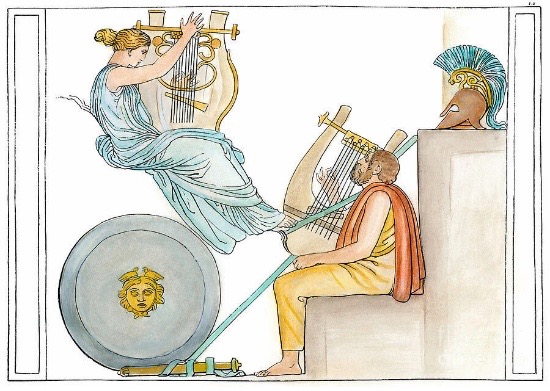Issue 2 Contest
$1000 in prizes will be awarded as part of our Second Issue and Homer Themed Competition
Students: We would like to talk about the Muses.
Homer: I was wondering when you would ask me about them. Your questions are deeper than what I am usually asked.
Students: You begin both of your works with an invocation.
Homer: Shall I do this for you?
The wrath sing, goddess, of Peleus' son, Achilles, that destructive wrath which brought countless woes upon the Achaeans, and sent forth to Hades many valiant souls of heroes, and made them themselves spoil for dogs and every bird…
And:
Sing to me of the man, Muse, the man of twists and turns
driven time and again off course, once he had plundered
the hallowed heights of Troy.
So, what do you want to know?
Students: We do not want to ask the usual questions, about how many Muses there were or their names. We want to know whether these invocations are just formal and conventional, or whether you hear the Muse singing and merely record?
Homer: A rhapsodist will sing my work; how does that feel?
Students: Like we are out of our bodies.
Homer: Are you constantly thinking about what comes next?
Students: No, we just sing what has become part of us.
Homer: Then you, of all people, should understand what it is for me to write.
Students: This does not seem to be the same thing at all. We have memorized what you have written. You had to write these long and magnificent works. Your process must be a conscious, thinking one. You are making choices at every point, intelligent, mindful choices.
Homer: That is true, but the word ‘choice’ is correct and instructive. Much has come down to me, and I choose and selected how to present the stories.
Students: Let us take what we think of as the most interesting choice: to focus the Iliad on just the tenth year of the siege. And not to go as far as the Trojan Horse and the sack of Troy.
Homer: I do, of course, refer backwards, as in the Catalogue of Ships, and I do refer to the events about the end of Troy in the Odyssey.
Students: Did the Muse or Muses affect those choices? Was it not all you, the great poet, taking a long time to construct your work in this way?
Homer: If you mean, did a Muse tell me to focus on the tenth year, no. But the Muse is always dancing in the stream of tradition, and I see her dancing in that water, and I feel the stream itself guiding me. I am just taking some water from the stream and using it to give nourishment to the people who are so thirsty to understand the past and their own lives.
I never felt like I was making something up, or doing something of my on invention. I admit that I am important, and that I have brought a great many traditions and ideas together, but I feel like she was always there: the Muse was part of how I was able to produce my works. If there is one thing I have been trying to teach you, it is the complexity of everything.
In the last few sessions, I’ve tried to explain that the gods can affect what a person does, but that the person still does it of their own will. Two causes. I would now say the same for how I work: Yes, it is the Muse, and yes, it is me. And we are part of something even greater.

The Iliad of Homer engraved from the Compositions of John Flaxman R.A., sculptor, London 1805.
$1000 in prizes will be awarded as part of our Second Issue and Homer Themed Competition
Our First Issue has now been compiled into one collection for the ease of sharing and reading.
The first issue of our new journal Epic Threads is now live.
